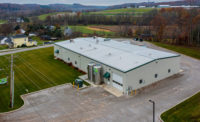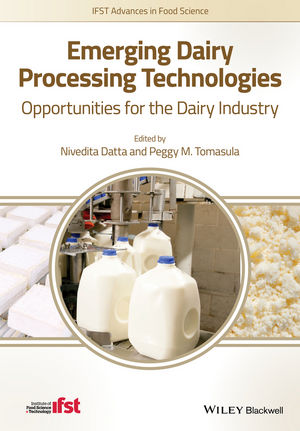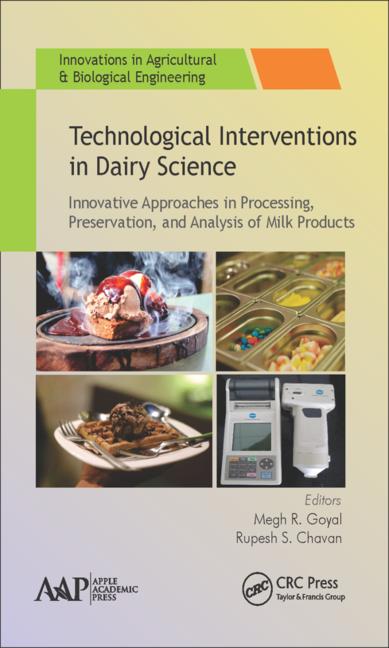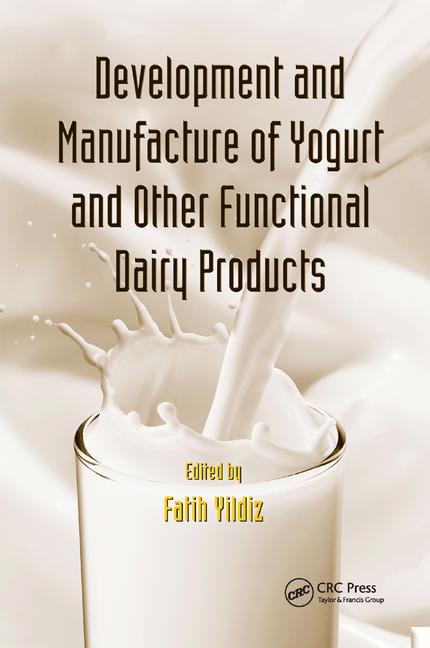Amish-run Green Field Farms combines old world methods with innovation
The cooperative might use ancient farming methods, but its product development efforts focus on meeting the needs of the contemporary consumer.

Pictured (left to right) are Brian DeFelice, vice president of sales and marketing; Matt Collins, dairy manager; and David Snyder, produce sales manager. CEO Leon Wengerd and other members of the executive team are not pictured, as Amish people traditionally do not pose for photos.
After noticing local farms were beginning to disappear, Amish and Mennonite farmers joined together to form Green Field Farms Co-op.


Green Field Farms packages many of its milk products in reusable glass bottles.

Green Field Farms’ seal of authenticity communicates to consumers that its milk was sourced from Amish and Mennonite farms.
The Amish community is often associated with its continued embrace of traditional agrarian values, and in that sense, Wooster, Ohio-based Green Field Farms fits the bill. The cooperative is run by Amish and Mennonite farmers whose methods harken back to simpler times — horse-drawn plows are used to till the soil, for example.
But Green Field Farms’ approaches to developing, producing, and marketing new products are firmly in the 21st century. And the company is on a mission to bridge the gap between the Amish-run farms and the consumer while maintaining its traditional roots.
“We're bringing back the values and these principles from this bygone era that are still very valid today, bringing those along, and yet we need to adapt to the needs of the customer today,” says Leon Wengerd, CEO, who is a member of the Amish community. “We cannot process milk in cans, milking by hand like we once could many years ago because we are in 2021, and we need to adapt to the market needs of today.”
Keeping heritage alive
Many of the farms that Green Field Farms works with have been around for centuries, but the cooperative itself was formed in 2003, notes Wengerd. Amish farms in the area were beginning to disappear as they struggled to compete with larger-scale operations, and farmers began to discuss what they could do to remedy this situation.
“They assembled a group of people that shared their same concerns, and they organized the work directors and formed a cooperative — Green Field Farms Co-op,” he says.
The farmers then began to research current market conditions to figure out how they could be competitive. They learned that 50% of shoppers don’t care much about the product they buy other than that it is cheap and tastes good. However, within the remaining half of consumers, 20% are willing to pay more for healthy products that are produced safely by people they trust.
“And that was the foundation of the cooperative of Green Field Farms,” Wengerd explains. “In developing the production standards for the farms, we came right up against organic certification standards. To keep it simple and because that was already in place, we adopted organic standards for our farmer production standard.”

While Green Field Farms uses organic standards as an easy-to-understand certification for end consumers, the cooperative has a “beyond organic” mentality, Wengerd notes. And the company has an additional “seal of authenticity” — which is communicated on its packaging via a buggy icon — to highlight that its products were sourced from Amish- and Mennonite-run farms that us via traditional methods.
“Our producers are all part of the Amish and Mennonite communities that still use [a] horse and buggy for transportation, which harkens back to our seal of authenticity,” he points out. “The small buggy certification symbol guarantees this product really is coming from these small family farms that still use horse and manual transportation.”
The “beyond organic” ethos is also exemplified by the small herd sizes in the cooperative’s farms — a factor that, Wengerd says, contributes to Green Field Farm’s high-quality milk. The herds consist of 25-50 cows, which means that farmers are able to spend time with each animal.
“They give the cows names, and they have that personal interaction with the cows and also with the land,” he emphasizes. “The land is the foundation of what our product is coming from, for not only the animals but also to produce crops and so on.”
The farmers’ close relationship with both animals and the land epitomizes Green Field Farms’ vision statement, “which is to preserve the agrarian lifestyle of the plain communities by enabling us to support our small family farms, to inspire people and communities to practice faithful land stewardship,” Wengerd notes.
Changes in product offerings
When Green Field Farms was founded in the early 2000s, it produced only eggs and cheese. The cheese was processed by other companies in the area instead of by the cooperative itself, Wengerd points out. In 2007, it added a produce program, and in 2018, a dairy program. This is when the company constructed a state-of-the-art dairy processing facility from scratch so it could manufacture products itself. The new plant also opened up the opportunity to start co-packing for other dairies. (The company discontinued its cheese program as other operations grew).
In terms of dairy products, Green Field Farms now offers organic cream-line milk (which is cream-top non-homogenized) and organic homogenized milk, explains Brian DeFelice, vice president of sales and marketing. This organic milk is unique from many milk products as it is produced via a low-temperature vat pasteurization process.
This method of milk production keeps “the milk close to the raw stage, preserving more of the nutrients in the milk for the end consumer for a healthier diet,” Wengerd explains.
Green Fields Farms’ milks are available in whole, 2%, skim and chocolate. The company’s whole milk is very rich, notes DeFelice. It is closer to 4% fat than the 3.25% usually seen in similar products.
In terms of packaging, the cooperative’s products come in 64-ounce glass bottle returnables or 53-ounce plastic cartons. The company also offers 12-ounce single-serves and some quarts — such as with their new eggnog.
While the company crafts organic products from its own milk sources under its own brand, it also has the capability to produce nonorganic offerings as a co-manufacturer or co-packer, he adds. The company’s plant has segregated production times.
Green Field Farm’s most popular offerings are those packaged in 64-ounce returnable glass bottles, notes DeFelice. Consumers return the bottles to their store of purchase, and then they are cleaned and re-used by Green Field Farms.
In terms of distribution, the cooperative services many Whole Foods Market stores and organic stores in Ohio and the Mid-Atlantic region. Green Field Farm’s products are also sold at “mom and pops” in the area, DeFelice points out.
Meeting market needs
While many of Green Field Farm’s dairy offerings are “traditional,” the company is looking to expand into new product areas, Wengerd remarks. To that end, the cooperative hired its first dedicated research and development staff member this past summer.
When brainstorming a new product to add, the company focuses on what value it can add to the marketplace that also is doable in its current manufacturing facility, he notes. Green Field Farms also turns to its current customers to discuss their needs and challenges and how the cooperative can help them address those needs via new offerings.
“In the market research, we're looking at what really is out there in terms of a niche that we can provide the product that has strong customer demand that lends itself well to our current manufacturing process,” Wengerd notes.
Assuming a product idea fits its manufacturing capabilities and meets a consumer need, Green Field Farms starts by developing a recipe and tweaking it until it has “the absolute best density and taste,” he explains. Branding and marketing are done as the product is brought to market.
A recent product introduction from Green Field Farms is eggnog, DeFelice points out, which comes in nonreturnable glass quart-sized bottles. What sets this product apart from similar offerings is its nutritional label.
“[It’s] little harder to make with all-natural [ingredients] … but that's who we are,” he emphasizes.
In the near future, the company plans on launching strawberry milk and a coffee drink.
“[In] developing that niche in the marketplace with all the coffee brands that are out there, ours will be the certified organic with our seal of authenticity as well,” Wengerd explains.
Emphasizing nutrition, nostalgia
According to DeFelice, Green Field Farm’s biggest competition are other organic companies. The amount of organic product coming to market is growing as consumer interest in this area also is increasing. However, the cooperative’s cream-top milk is something that sets it apart from other companies — along with its milk source and Amish heritage.
“The quality of our milk is what really separates us in the marketplace,” adds Wengerd. “It's that additional value to the customer by how we process it and how it arrives at the customer's door.”
And the Amish heritage is something that very few other companies can tout, notes DeFelice, which includes Green Field Farm’s vision to support small family farms “that generation after generation can continue to farm the land.”
Another selling point to potential customers: Green Field Farms is a very service-oriented company.
“We want to take care of our customers,” DeFelice says. “We'll bend over backwards to get the product wherever possible. If we make a mistake, we're gonna correct that ASAP. So, that's who we are.”
In terms of end consumers, within that aforementioned percentage of consumers who pay more attention to where their products come from, Green Field Farms tends to attract shoppers who are interested in its nutritional claims, notes Katie Howell, marketing manager.
In addition to an older generation who purchases Green Field because of a nostalgic association with its glass bottles, Howell says she’s recently noticed more millennials purchasing the cooperative’s products as they begin to move away from nut “milks.”
“People are realizing that they actually do need a lot of the benefits from animal byproducts, especially the organic whole milk,” she points out.
Other typical consumers are those who have lactose intolerance, as the low-vat pasteurization preserves enzymes that make milk easier to digest for those with digestive issues, Howell explains.
“A lot of people are beginning to search for organic, non-homogenized, low-vat pasteurized milk. If they haven't discovered us yet, they're searching for our kind of milk because they know — if they've experienced raw milk — that it is easier for your gut to digest it because a lot of those butterfat particles are intact still,” she adds.
To attract more customers, Green Field Farms is investing in a marketing strategy that includes a lot of in-person sampling now that that is more possible again, Howell notes. The company recently held tastings at 20 Whole Foods Market stores.
“I think the most important thing for us right now is getting our product in front of consumers. People love our product when they try it, but you don't know that till you try it,” she adds. “So definitely getting someone to taste the quality in Green Field Farms’ milk is the first step.”
Green Field Farms is getting the word out by building relationships with social media influencers and restauranteurs and through media coverage. For example, the cooperative recently participated in a podcast interview for the Weston A. Price Foundation, a Washington, D.C.-based organization that focuses on nutritional issues.
“They have over 6 million downloads at this point and regularly appear in the top 200 of alternative health podcasts on Apple Podcasts, so [we’re] pretty excited about the potential influence that this podcast interview will produce,” notes Howell.
In terms of social media, Green Field Farms focuses on Facebook, Instagram, YouTube, and recently TikTok; Facebook has been the most successful, she says.
Overcoming challenges
As a smaller company and a newcomer to the dairy case, Green Field Farms has to overcome some hurdles to win over potential customers.
“The dairy case is only so big. And so you really have to make sure that your product is of the highest quality within that category, and that you have a great sales program behind it,” notes Wengerd. “There's a lot of good competitors out there, so it's not an easy thing to do. So it takes time.”
The company was starting to build momentum with its dairy products in the couple of years right after they launched in 2018, but the pandemic contributed to flat growth in that area in 2020-2021. A challenge was that early in the pandemic, Green Field Farms was unable to do its sampling programs at retailers to garner new consumer interest, explains David Snyder, produce sales manager. The company also found Zoom meetings with potential customers to not be as effective as in-person ones.
Speaking of the pandemic, the largest challenge there was that the cooperative was unable to re-accept its glass bottles for a time.
“At the same point, there was some challenges on the supply side … and we were getting more volume since we were using a lot more new bottles,” says DeFelice, explaining that increased cost of packaging continues to be a struggle, though more consumers are now returning bottles.
Looking to the future, Green Field Farms hopes to use more of the capacity it has at its dairy plant, says Wengerd, and to further expand its distribution.
“In three years, we want to be much closer to maximizing our capacity,” emphasizes James Swartzentruber, chief financial officer. “That is really our growth focus — just to maximize our capacity … [through] private labeling and co-packing and contract manufacturing, whatever it might be.”
Looking for a reprint of this article?
From high-res PDFs to custom plaques, order your copy today!









